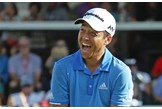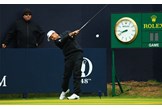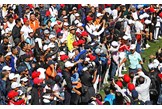Xander Schauffele: Inside life on the PGA Tour
Published: Last updated:
Success hasn’t come fast or come easy for Xander Schauffele, the 26-year-old American. But as Kit Alexander explains, he’s now ready to make the big jump from PGA Star to major winner.
Xander Schauffele didn’t arrive onto the PGA Tour with any fanfare. There was no Walker Cup appearance, no eye-catching performance in a major or PGA Tour event as an amateur, and no sponsor invitations to kick-start his career when he did turn pro in June 2015. In fact, he had to do things the old-fashioned way – going through all three stages of Web.Com Tour Q School before serving his apprenticeship on the second-tier circuit and grabbing a main tour card without recording a win.
Despite these relatively humble beginnings, Schauffele is now firmly established among the game’s elite and many are tipping him to be the next player to secure a maiden major victory. As the standard, stature and pressure of events increases, he just seems to get better.
He was named PGA Tour Rookie of the Year in 2017 courtesy of two wins, including becoming the first rookie ever to win the Tour Championship. More high-profile victories followed at the 2018 WGC-HSBC Champions and 2019 Sentry Tournament of Champions, as he rose into the top 10 of the world rankings. But perhaps most indicative of his big-game skillset and mentality is his major record.
He’s already notched an impressive five top-six finishes in his first 11 appearances in the big four events. His slate this season read T2-T16-T3-T41, with only Brooks Koepka scoring better among the 16 players who made the cut at all four.
This interview comes from our sister magazine Golf World – subscribe to their magazine here.
Before we go back to your beginnings and all that, we should probably ask what happened with your driver at The Open?
The R&A tested it, and it didn’t pass. It barely missed. So I had a bit of a run-in with The R&A because they only test 30 players, which wasn’t the most fun. I thought it was a little unfair. I would gladly give up my driver if it’s not conforming, but there were still 130 other players in the field that potentially had a non-conforming driver as well. I had a word with them [The R&A] and hopefully they take my comments and concerns seriously because it wasn’t my plan to show up Tuesday morning of a major and be doing driver testing on Tuesday evening. It’s not really what players want to be doing. This matter should be private. But The R&A didn’t do their job in keeping it private. What’s the fair thing to do? Just test the whole field. It’s plain and simple.

OK, so let’s rewind a little. Your father is the only swing coach you’ve ever had. How did that come about and what’s your swing philosophy?
His – and my – philosophy is pretty simple. I’m trying to think what the proper lingo would be. He’s not a swing mechanic, but he’s a club mechanic, so he stresses the importance of the club being a tool and using the tool properly versus trying to get my swing in certain positions. He’s taught me from a young age how the club works, how it needs to work and how it can work. Also, along with that, all the ball flight rules. So we’ve developed my swing based on those fundamentals.
Does that enable you to understand what’s happening in your swing and self-diagnose better than other players?
Yeah, at a young age. I was probably 12 years old and he asked me if I wanted to be a Tiger Woods or Freddie Couples – do I want to know a lot about my swing, or be a free swinger and not think a whole lot? I said I want to be more of a Tiger. It was really difficult because I didn’t understand a whole lot about club mechanics, ball flight, path and effect and all those things. But now, at 26, I’m grateful that he did explain it all to me at a young age so I can grasp it now and potentially correct myself on the course, if needs be.
How important was it to get onto the PGA Tour pretty quickly after turning pro in June 2015?
I think it was important. The Korn Ferry Tour (formerly Web.Com) is a great tour. If I’d fallen back, I think I’d have come back up eventually. There are always times as a young pro when you doubt what you’re doing and don’t know if you’re ready. I finished 26th [on the Korn Ferry Tour regular season money list in 2016] and I knew I was ready to move up the ladder. It was crucial for me to keep my momentum going and earn my PGA Tour card in the Finals. To get through it was massive, just to give myself the opportunity on the PGA Tour. Golf these days is becoming so hard to qualify for the bigger tours. It’s all about opportunity and taking advantage of it.
What enabled you to transition so well to life on the PGA Tour?
Probably my mindset. I didn’t expect much and there was no one telling me that I’m going to be great. My dad always told me to let my clubs talk and my clubs were my way around the world. That was his motto for me and that’s what I try to do. I kept my head down and no one was telling me I was going to do it, so I just tried to prove it all to everyone, especially prove it to myself, which was important.

Why do you think young amateurs are hitting the ground running so quickly when they turn pro nowadays?
Tiger Woods mainly. Young golfers are developing so much faster and acting like a pro way faster. Parents catch on to what the pros do and they run their kids through it. But for all the success you see, you also see a lot faster burnouts than you used to in the past so it’s a very fine line. But kids are working out earlier, having several coaches at younger ages and they’re not afraid. Look at my year for example [the high school class of 2011], with the likes of Justin Thomas, Jordan Spieth, Daniel Berger, Emiliano Grillo. All those kids won on the tour while I was still in college and on the Korn Ferry Tour. I was watching all these guys win. There are all these kids coming out young and all it takes is for you to watch a guy your age win and you’re like, “I can do this as well”.
Did you feel pressure seeing that other guys of your age were ahead of you and winning on the PGA Tour already?
Not at all. They’ve always been ahead of me. My dad and I always discussed that they were about a year-and-a-half to two years ahead of me and I still feel like they are a little bit ahead of me in terms of overall game. They’ve always just had an earlier start. Becoming a good player and doing the right thing takes time, so I’ve been trying to stay patient even though I was watching these guys win right out of the gates. It was definitely motivating.
What was it like to win really the first time you were in contention at the 2017 Greenbrier?
It was the first time I had any chance of winning. I think I was within one shot with three holes to play. It was awesome. I was very nervous. My caddie was nervous. It was the first time for both of us. We sort of had a blackout moment there on the last hole where we had a good club and didn’t really think a whole lot. I was panicking in my head trying to get the shot off and I was grateful I only had three or four feet for the putt because my hands were shaking so much. It was an awesome experience.

You played the final six holes of the BMW Championship on six under to force your way into the Tour Championship and then become the first rookie to win it with a birdie on the final hole. What do those performances under the gun tell you about yourself?
You learn a bit about yourself. I learned that when the pressure builds, I try not to shy away from it. I try to embrace the moment and realise what is happening before it happens to me. You can have 20/20 vision in hindsight and think “If I’d just done this I’d have won”, but I try to be in the moment at all times. I think that’s good coaching from my dad and good nurturing to get me ready for those big moments.
How significant was it for you to be named Rookie of the Year in 2017?
It’s special. If you look at the list of players who’ve been previous Rookie of the Year, most of them have gone on to have great careers. So it’s a real compliment. It’s a vote from your peers, so it was a great honour for me to hold it and definitely a great start to my career.
The following season was tough…
Yeah, I feel like I struggled quite a bit coming back out with people expecting me to play better and I expected a lot of myself. I think I missed seven of the first 14 cuts [with one top-20] in my rookie season on the PGA Tour and I thought I was going to lose my card until the US Open [T5th] was my breakout and then shortly after that I won at the Greenbrier. I played good golf for a few months and managed to back it up after that, but you quickly forget that I felt like I was going to lose my card earlier that season. It was crazy.
How much did raised expectations play a part?
Yeah, absolutely. Without even wanting it, it just happened. Especially with myself. I won two tournaments in three months or so and you think you should win more. But the following season I didn’t win at all, which was frustrating because it came so easily in that stretch in my rookie year and then I was trying to force it during my second year on tour. It was a great learning experience and I wouldn’t trade it for anything else. Every time you win, it puts things in perspective and you have to reset and just do what you do best.
How did it feel to miss out on a Ryder Cup pick and did you use any disappointment as motivation?
I didn’t think I was too unlucky. Tony [Finau] played incredible when the pressure was on and had a lot of top-10s in the lead uptothepicks.Myhatisofftohim,andI wasn’t really upset. I tried to give Aronimink [the BMW Championship] a run and I finished tied-third. I thought if I could win then I’d get picked but I fell short there. But it wasn’t disappointing. It made me just want to work harder and be more clutch. I had opportunities to get on the team, it was right there in front of my face and I didn’t get it. So wanting to get back to work was my mentality.
You delivered in the clutch again pretty soon after that by winning the WGC – HSBC Champions with the low round of the final day and then clinching the Sentry Tournament of Champions with a closing 62 in January this year. What do you take from the manner of those victories?
I think it’s good, but I still have a lot to learn. They were both come-from-behind wins, but they were very different because in China I was in the mix and in Hawaii I came from way out of it. It’s good to know I’m capable of coming from far behind or in the chasing pack, but the next step in my career is for me to go wire-to-wire and hold a lead and maintain it.
Why have you decided to be a member of the European Tour as well?
My dad and I feel there are so many good opportunities on the European Tour and there’s so much to do beyond the PGA Tour. Me signing up expands my schedule if I want to. It creates more opportunities.

Your father is half German and half French and your mother is Taiwanese. How has their heritage influenced you?
I grew up as the only natural born American citizen in my family, so I feel like our household is not American at all. Growing up, my friends were all American, but I could tell my family was very different. I think that upbringing has made me more international and more understanding to different cultures and foods and helped me travel easier. I understand more things than just growing up here in the US, so I’m grateful to them for making me an international kid.
You’ve already had five top-sixes in your 10 major appearances. Do you think your game is especially well suited to the bigger events?
I think my mindset is important. Brooks [Koepka] has talked about the mindset he gets going into majors and I think my mindset changes a little bit. I become a little more patient and I think you focus just a little bit more during those weeks because there’s more on the line. I think my game can travel as well. When I’m playing well, I feel like I can win on any property, which is a good feeling. It’s all about trying to peak at the right time and getting your mind and body to work at the right time and we’ve been doing a decent job of that.
Do you feel ready to win a major?
Yeah, each time you get close you learn more. I had a top-five at the US Open but I didn’t really have a chance of winning the tournament. It was a good Sunday round. It was a good week, but I wouldn’t call it a great week because I didn’t have a chance to win the tournament. If you look at the Masters I was right there and The Open at Carnoustie, I had a chance at both of those to do something special and I didn’t pull it off, so I think if I can do that a few more times I’ll get even more comfortable coming down the stretch and pulling it off.

Just finally, what can we do to persuade you to play for Europe in the Ryder Cup?
(Laughs) Oh man, I’ve been asked that question several times. With me growing up in the US it would be a bit of a stretch, I think.






